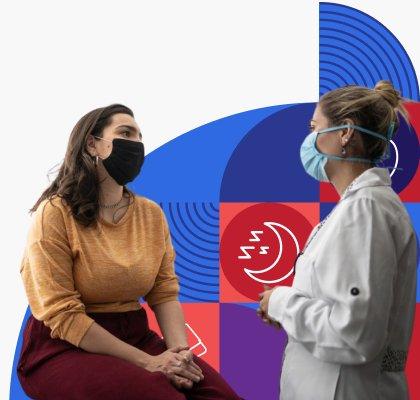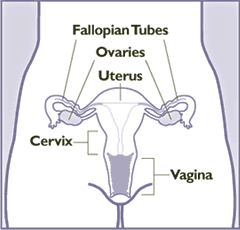Doctor Visits
Get Screened for Cervical Cancer

The Basics
Overview
Getting screened (tested) for cervical cancer means getting tested before you have any symptoms. Screening tests for cervical cancer include:
- Pap tests, also called Pap smears
- HPV (human papillomavirus) tests
These tests can help find cervical cancer. They can also find cervical cells that are infected with HPV or other abnormal cells before they turn into cancer.
Most cervical cancers can be prevented by regular screenings — and the right follow-up treatment when needed.
How often should I get screened for cervical cancer?
How often you need to get screened depends on how old you are and which screening tests you get.
If you’re age 21 to 29, get screened with a Pap test every 3 years.
If you’re age 30 to 65, you have 3 options:
- Get screened every 3 years with a Pap test
- Get screened every 5 years with an HPV test
- Get screened every 5 years with both a Pap test and an HPV test
Talk with your doctor about which option is right for you. Some women may also need to get screened more often. For example, your doctor may recommend that you get screened more often if you’ve had abnormal test results in the past.
If you’re age 66 or older, ask your doctor if you need to continue getting screened for cervical cancer.
Cervical Cancer
What is cervical cancer?
Cervical cancer is cancer of the cervix, which is the low, narrow part of the uterus that connects the uterus to the vagina.
Abnormal cells in the cervix can turn into cancer if doctors don’t find and treat them.
What causes cervical cancer?
Almost all cases of cervical cancer are caused by certain types of HPV (human papillomavirus). Some types of HPV cause genital warts, and others cause cancer. HPV is the most common infection spread through sex (vaginal, anal, and oral).
In most cases, HPV infections go away on their own. But when they last for a long time, they can cause cancer. Get more information on HPV infection.
Learn more about cervical cancer and screening:
Cervical Cancer Screening Tests
What happens during cervical cancer screening tests?
Cervical cancer screening tests usually happen as part of a pelvic exam. During this exam, you lie on your back on an exam table, bend your knees, and put your feet into stirrups.
While you lie on the exam table, the doctor or nurse will put a medical tool (called a speculum) into your vagina and open it to see your cervix. The doctor or nurse will use a special brush to collect some cells from your cervix. Then the doctor or nurse will send these cells to a lab, where an expert will check for abnormal cells or for the types of HPV that can cause cervical cancer.
These tests take about 5 minutes. It may feel uncomfortable, but it usually doesn't hurt. If you’re not comfortable being alone with the doctor or nurse during the exam, ask to have another health professional from the practice (like another nurse) in the room, too.
Learn more about cervical screening tests:
What else happens during a pelvic exam?
Cervical cancer screening is just part of a pelvic exam. During this exam, the doctor or nurse will also check your uterus, ovaries, and other organs.
Take Action
Get Screened
Take these steps to help prevent cervical cancer.
Get ready for your cervical cancer screening test.
Call a doctor’s office or health clinic to schedule your cervical cancer screening test and pelvic exam. Ask your doctor if you need to follow any special instructions before getting a cervical screening test.
Find out your test results.
When you get screened, ask the doctor how you’ll find out the results.
The kind of results you get can vary based on the type of test:
- Pap test results can be "normal," "unsatisfactory," or "abnormal"
- HPV test results can be “positive” or “negative”
It can take up to 3 weeks to get your results. If you don’t hear back by then, call your doctor’s office or clinic. Get help understanding your cervical screening test results.
If your Pap test result is "abnormal" or your HPV test result is "positive," it's important to get the follow-up care your doctor recommends.
What about cost?
Under the Affordable Care Act, most insurance plans must cover screening for cervical cancer. Depending on your insurance plan, you may be able to get tested at no cost to you. Check with your insurance company to find out more.
Medicare may also cover screening for cervical cancer at no cost. If you have Medicare, learn about Medicare coverage for Pap and HPV tests.
If you don't have insurance, find a program near you that offers free or low-cost cervical cancer screening tests.
To learn more, check out these resources:
Lower Your Risk
Get the HPV vaccine.
The HPV vaccine is recommended for children and adults ages 9 to 26. Most people get it as a pre-teen — but if you didn’t get it and you’re 26 or younger, talk with your doctor about getting it now.
If you’re age 27 to 45 and you haven’t gotten the HPV vaccine, talk to your doctor. They can help you decide if the HPV vaccine is right for you.
The vaccine protects against the types of HPV that most commonly cause cervical cancer and several other types of cancer. It also protects against the types of HPV that cause most genital warts. Learn more about the HPV vaccine.
Get your child the HPV vaccine.
All girls and boys need to get the HPV vaccine — usually at age 11 or 12, although your child can get it as early as age 9. If you have kids, make sure they get the HPV vaccine.
Get your well-woman visit every year.
During your visit, talk to the doctor or nurse about other important screenings and services to help you stay healthy. Find out more about getting your well-woman visit every year.
Content last updated March 30, 2023
Reviewer Information
This information on cervical cancer was adapted primarily from materials from the Centers for Disease Control and Prevention, the National Cancer Institute, and the Office on Women’s Health.
Reviewed by:
Rebecca Chasan, Ph.D.
Chief, Science Writing and Review Branch
Office of Communications and Public Liaison
National Cancer Institute
National Institutes of Health



